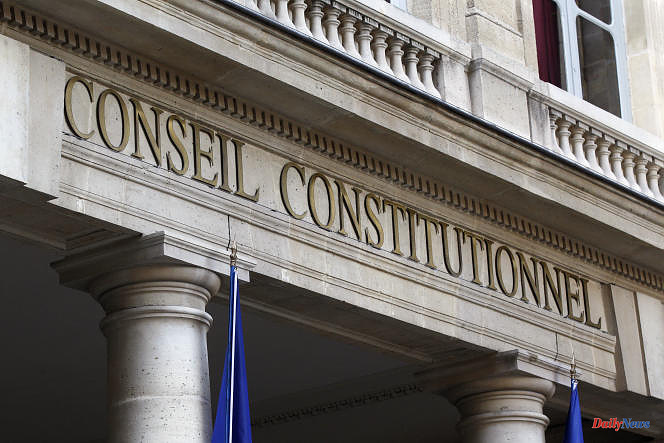Emmanuel Macron repeated it during his interview on March 22: he hopes that the pension reform will come into force by the end of the year. However, the game is not yet over. After the adoption of the bill thanks to article 49.3, all eyes are now on the Constitutional Council.
Seized jointly by the Prime Minister, Elisabeth Borne, and three distinct groups of parliamentarians – the New Popular and Social Union (Nupes) and the National Rally (RN) on the National Assembly side, the left on the Senate side –, the constitutional judges must rule in the evening of Friday, April 14 on the text, to determine whether its content and the way it was debated are constitutional. An essential prerequisite for the promulgation and entry into force of the reform.
What are the real risks of seeing this flagship reform of Emmanuel Macron's five-year term censored? Explanations on the points which can cause problems with three specialists of the Constitution.
What do opposition appeals filed with the Constitutional Council contain?
The appeal of the deputies of Nupes, who asks the Constitutional Council "to censor the entire text", revolves around three points:
On the far right, the authors of the referral filed by the RN take up more or less the same arguments, adding the violation of Article 34.16 of the Constitution, which provides that the PLFRSS draw a clear path towards balance finance of the social system.
The intergroup referral of socialist, environmentalist and communist senators also raises the question of the "unprecedented" accumulation of procedural instruments invoked by the government to "force Parliament to adopt the law".
Why is the use of the PLFRSS in the case of a pension reform questionable?
The first grievance of the Nupes and the RN therefore relates to the government's use of a PLFRSS rather than a classic bill to carry out its pension reform. The legislative tool is thus described as a "misuse of procedure" by left-wing deputies, and an "unsuitable legislative vehicle" for far-right parliamentarians.
The Social Security financing bill (PLFSS) is a text presented each autumn by the government to fix the financial balance of the different branches of Social Security for the following year. Once promulgated, it can be modified several times during the year by PLFRSS.
The government chose this vehicle mainly because budget texts escape the constitutional rule which prohibits the use more than once per parliamentary session of Article 49.3 – one of the few tools that allows the executive to pass laws despite its lack of an absolute majority in Parliament. He thus avoided drawing his last "joker" before the summer of 2023.
Even before the start of the parliamentary debates, this strategy caused people to cringe. "The method evades the debate within Parliament and weakens democratic deliberation", explained on January 17 Benjamin Morel, lecturer in public law at the University of Paris-Assas, in Le Monde.
Jean-Philippe Derosier, constitutionalist and professor of public law at the University of Lille, recalls that "it is a vehicle that was not initially imagined to carry out this type of reform". The academic, who participated in the drafting of the referral to the left-wing senators, specifies that, even if certain provisions have a direct or indirect impact on the Social Security budget, the government accepts the fact that this bill consists "to reform pensions and not directly affect Social Security finances."
The doubt is all the stronger, he continues, as this amending financing law is supposed to affect only the 2023 budget. of the last term of 2023, or even beyond", recalls Mr. Derosier, joining the warnings addressed to the government by the Council of State.
How does the reform review process undermine the clarity and sincerity of the debate?
The use of the amending PLFSS allowed the government to use the mechanism provided for in the second paragraph of Article 47.1 of the Constitution. Reserved for budgetary texts, this article provides that, "if the National Assembly has not decided on the first reading within twenty days after the tabling of a bill, the government seizes the Senate, which must decide within a period fifteen days".
In all, debates in Parliament were limited to fifty days (under the third paragraph of the same article). This prevented the deputies from voting on the reform at first reading in the National Assembly, in particular because of the avalanche of amendments tabled by the deputies of La France insoumise. The application of the deadlines provided for by this article cut short the parliamentary debate by automatically transmitting the text to the Senate, then to a joint committee, before returning to the National Assembly with a final adoption occurring after a new recourse to 49.3, March 16.
Were these tight deadlines justified? They were imagined by the Constitution to guarantee that the Social Security law intervenes quickly in response to a need. “However, there is no urgency to reform the pension system; it is a political choice by the government to want to do it quickly, but there is not a deadline like the one there is every year when the Social Security financing law is adopted, which must be adopted before December 31,” explains Jean-Philippe Derosier.
Thus, the use of 47.1 could constitute an attack on "the clarity and sincerity of parliamentary debate", which is nevertheless a constitutional requirement.
During the parliamentary progress of this reform, the government requested a large number of procedural instruments, perceived by the opposition as a limitation of speaking time and an attack on the proper conduct of parliamentary debate:
The Constitutional Council must ensure the smooth running of democratic debate, the quality of the law, but also respect for the parliamentary work of drafting the law. Thibaud Mulier, lecturer in public law at the University of Paris-Nanterre, recalls that, "even if the argument of respect for the Constitution is understood, in the end the National Assembly has never pronounced on the texts" .
If all these instruments are in conformity with the Constitution, taken independently, their accumulation all the same questions the jurists: "It is unprecedented that so many procedural levers have been activated within the framework of the discussion of the same law, and this accumulation raises another doubt about the clarity and sincerity of parliamentary debate, ”notes Mr. Derosier.
Censored "social riders"?
We speak of "social riders" for provisions whose presence in a Social Security financing law is not justified with regard to Article 34.20 of the Constitution and Article 1 of the organic law relating to financing. of social security. "This is a measure that has no impact on the financial consequences of the Social Security budget," summarizes Thibaud Mulier.
But Laurent Fabius, the President of the Constitutional Council, warned that he would be vigilant on the subject: "We will look [if the project] has a financial impact, because anything that is outside the financial scope can be considered as a budgetary rider" , Mr. Fabius told reporters in January, according to comments reported by Le Canard enchaîné.
The main measure in the hot seat is the "senior index". This provision of the reform, supposed to improve the employment rate of seniors, does not directly affect the Social Security accounts, since it is an obligation of transparency imposed on companies, under penalty of financial sanctions. .
The creation of a "senior CDI", introduced into law by a right-wing amendment in the Senate, risks the same fate. This measure was intended to encourage the recruitment of employees aged 60 and over.
Is global censorship of the text possible?
Can all these elements tip the balance towards total censorship of this pension reform by the Constitutional Council? "In absolute terms, total censorship is quite possible," says Jean-Philippe Derosier. If the sages were to retain the fact that the legislative vehicle is not appropriate and that the principle of clarity and sincerity of the debates has been so altered that it affects the entire law, total censorship will be incurred. »
Also emphasizing the risk of unconstitutionality "for procedural rather than substantive reasons", Thibaud Mulier rather expects "partial censorship" of certain "social riders".
In the past, the Constitutional Council has already carried out total censorship of laws, including financial ones. But the one that lawyers regularly cite for a procedural reason is a distant decision, relating to the 1980 finance law. "This is the emblematic case where there was censorship for a procedural reason, recalls Jean-Pierre Camby, associate professor at the University of Versailles-Saint-Quentin-en-Yvelines and specialist in electoral law. The Constitutional Council had censored this text because the government had not respected the two-part vote, namely to assess revenue first before expenditure. »
For this pension reform, however, the arguments of the opposition may not be enough, according to Mr. Camby: “The application of these constitutional texts cannot lead to a decision of unconstitutionality drawn from the procedure. The academic notes that "the general arguments on the clarity and sincerity of the debate put forward by the oppositions are rather of a political nature, which the Council has a habit of rejecting, even if the classic conditions of the debate are altered. ". According to him, total censorship of the Constitutional Council could appear as "a declaration of open war against the executive and the senatorial majority". In the tense social context, "this decision, necessarily legally questionable, would add fuel to the fire and would be perilous".












